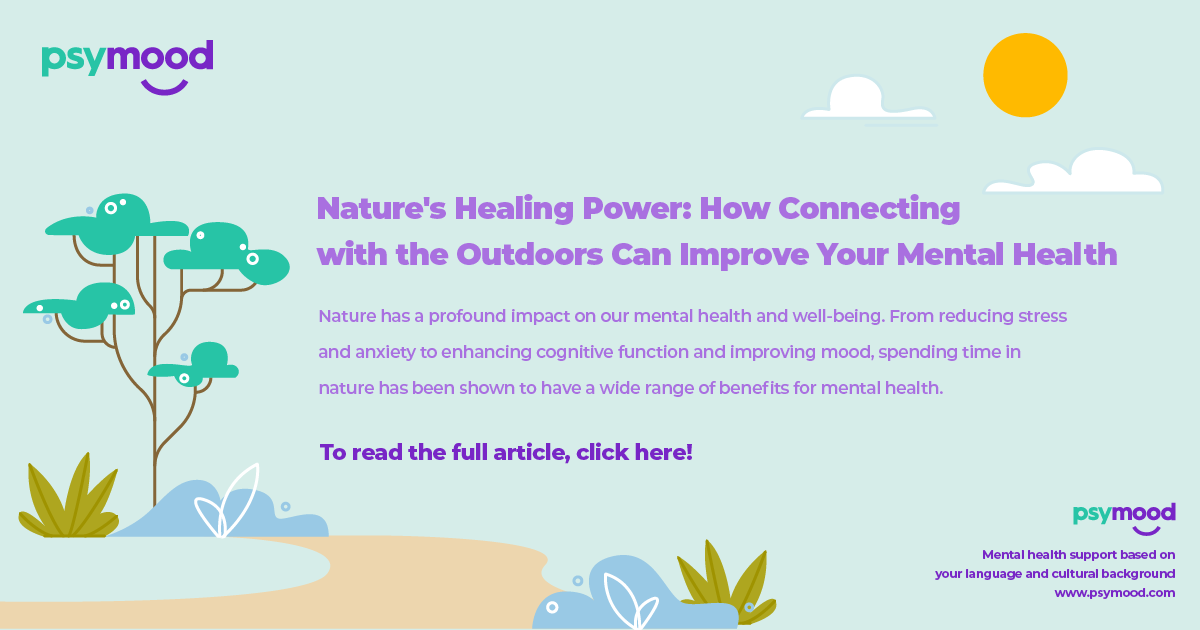Nature's Healing Power: How Connecting with the Outdoors Can Improve Your Mental Health
Nature’s healing power has a profound impact on our mental health and well-being. From reducing stress and anxiety to enhancing cognitive function and improving mood, spending time in nature has been shown to have a wide range of benefits for mental health. Whether taking a walk in the park, hiking in the mountains, or simply sitting outside and enjoying the sunshine, connecting with nature can be a powerful tool for promoting mental wellness. In this blog, we will explore the science behind how nature helps mental health and offer practical tips for incorporating nature into your daily life to improve your mental well-being.
How Being in Nature Benefits Us: The Research
Over the years, there has been a significant amount of research conducted on the impact of nature on mental health. Research has found that being in and around nature can really benefit your mood and your overall well-being. In particular, studies have found that exposure to nature, whether it’s through walking in a park or viewing nature scenes, can reduce cortisol levels, the hormone associated with stress. One study found that even a 20-minute walk in nature can significantly lower cortisol levels.
Moreover, numerous studies have found that spending time in nature can improve mood and reduce symptoms of depression and anxiety. A study published in the International Journal of Environmental Research and Public Health found that individuals who spent time in green spaces reported lower levels of anxiety and depression. Research has also found that exposure to nature can improve cognitive function and attention span.
Being in nature often involves physical activity such as hiking or walking, which has been shown to improve physical health and release endorphins that improve mood. One study published in the American Journal of Preventive Medicine found that individuals who engaged in physical activity in natural environments reported greater feelings of revitalization and decreased feelings of tension, confusion, anger, and depression.
5 Effective Therapies Involving Nature
Several therapies involve nature and have been shown to be effective in improving mental health. Nature therapies are often used in conjunction with traditional talk therapy, (psychotherapy), and medication to treat mental health conditions such as depression, anxiety, and PTSD. They can be effective for individuals who prefer a more holistic and nature-based approach to mental health treatment.
Ecotherapy: Ecotherapy, or nature therapy, involves outdoor activities such as gardening, hiking, or animal-assisted therapy. The focus is on connecting with nature and using it as a tool for healing and improving mental health.
Wilderness Therapy: Wilderness therapy involves outdoor activities such as camping, hiking, and backpacking, and is typically used as an intervention for individuals struggling with mental health or addiction issues. The goal is to use the challenges of the wilderness environment to promote personal growth and self-awareness.
Horticultural Therapy: Horticultural therapy involves using gardening and other plant-related activities as therapeutic tools. The focus is on connecting with nature and using it as a way to promote physical and emotional healing.
Animal-Assisted Therapy: Animal-assisted therapy involves using animals such as dogs or horses as therapeutic tools. The focus is on the human-animal bond and the benefits it can have for mental health, such as reducing anxiety and depression.
Nature-Based Mindfulness Meditation: Mindfulness meditation involves focusing on the present moment and being fully present in the experience. When combined with nature, mindfulness meditation can help individuals connect with the natural world and experience feelings of peace and tranquility.
How You Can Incorporate Nature into Your Life
We now know that nature has some amazing benefits for our overall well-being, but how can you incorporate nature into your life? Incorporating nature into your life doesn’t have to be complicated or time-consuming, there are many simple ways of adding a dose of nature to your everyday life.
- Spend Time Outside: Spending time outside in nature, whether it’s a park, a trail, or your backyard, can improve your mood and reduce stress.
- Exercise Outdoors: Exercise is an effective way to improve mental health, and doing it outside in nature can have even greater benefits. Activities like hiking, biking, or running outside can improve mood and reduce anxiety.
- Bring Nature Inside: Even if you can’t get outside, bringing plants or other natural elements inside your home or office can have a positive impact on your mental health.
PsyMood is a digital tool designed to help you find the support you need in the language that you are most comfortable with. PsyMood considers cultural background, geographical location, interests, and personal needs, amongst other factors, to pair you with service providers for either online or in-person therapy sessions.


.png)
.png)
.png)
Recent Comments